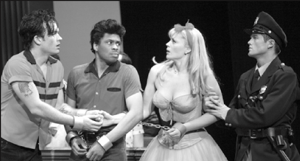By Scott Harrah
Cult filmmaker John Waters may be a pop icon, but it is impossible to think any adaptation of his films could be as colorful, powerful and seamless as the Tony-winning 2002 musical version of his 1988 magnum opus, “Hairspray.” It would be unfair to compare “Cry-Baby,” the latest Broadway adaptation of one of his classic films, to “Hairspray,” which is still running after nearly six years. “Hairspray”—a mirthful mix of civil-rights comedy-meets-classic 1960s music—was one of those rare musicals that was actually better than the great film on which it was based. The movie “Cry-Baby,” which starred Johnny Depp, was mediocre at best.
The only thing “Cry-Baby” has in common with “Hairspray” is the fact that it’s about rebellious teenagers in Waters’s native Balitmore. Even the 1990 film was a tepid rip-off of “Grease” with its ’50s-era story about a goody-two-shoes girl falling in love with a bad-boy greaser type. The musical adaptation of “Cry-Baby” is more like the current musical rendering of Mel Brooks’s “Young Frankenstein”: a pedestrian, shrill, overdone stage version of an amusing film that simply does not translate well as a Broadway musical comedy.
Broadway’s “Cry-Baby” does indeed contain a lot of Waters’s trademark “bad taste” and vulgarity. There are female cast members in too-tight clothing and many ribald one-liners that will please Waters’s fans. The best thing about the show is Tony-winner Rob Ashford’s lively, kinetic choreography, with dance moves far more suggestive and overtly sexual than anything Bob Fosse ever created.
In typical Waters style, the show opens with an outrageous scene, featuring the song “Anti-Polio Picnic.” The always over-the-top Harriet Harris plays Mrs. Vernon-Williams, a prudish woman who teaches teenagers etiquette. She’s gathered all the “good” kids in town for polio vaccinations, and tries to scare them into getting their shots by parading around a teen in an iron lung. When a group of “bad” kids arrive on motorcycles with their leader, Cry-Baby (James Snyder), Mrs. Vernon-Williams’s wholesome granddaughter, Allison (the winsome Elizabeth Stanley), falls madly in love with him at first sight. From this point on, the show features a manic, spastic barrage of rock-and-roll songs, with choruses of teenagers thrusting their hips Elvis-style. Despite all the vigorous writhing, sprightly dance moves and upbeat singing onstage, songs such as “I’m Infected” and “Girl, Can I Kiss You?” have inane lyrics, uninspired melodies, and blend together into one big, ear-splitting cacophony of meaningless noise. Unlike other retro musicals, there’s not even one memorable song in “Cry-Baby” that you’ll find yourself humming in your head once the curtain falls.
The most glaring flaw of the show is the casting of James Snyder as Cry-Baby, the leather-clad orphan whose parents were executed a few years earlier for allegedly being communist radicals. In the movie “Cry-Baby,” Johnny Depp portrayed the character with an endearing sense of non-conformity and trailer-trash zeal. However, in this adaptation, Snyder has almost no stage charisma to keep audiences enthralled, and little chemistry with Elizabeth Stanley, the female lead, who’s a bit like “Grease’s” Sandy minus the Australian accent. Snyder has a good voice, but he seems too squeaky clean to be a greaser.
The movie had a paper-thin plot, and “Cry-Baby” the musical also suffers from a flimsy narrative that’s mostly padded out with lots of songs and bumping and grinding. The only razzle-dazzle musical number is “Jailhouse Jubilee,” featuring a chorus of male prisoners tap-dancing with license plates attached to their feet, but it’s simply a derivative copycat of Elvis Presley’s “Jailhouse Rock.”
The only other notable aspect of “Cry-Baby” is the performances of some supporting cast members. Chester Gregory II is delightful as Dupree, a Little Richard type who sings at a redneck rock joint where all the bad kids hang out. Christopher J. Hanke is quite convincing as the “square” that wants to steal Allison away from Cry-Baby. Carly Jibson is quite fun as Pepper, a pregnant teen who, along with her pals, helps teach Allison how to be a bad girl. Alli Mauzey is often hysterical as Lenora, a crazed fan of Cry-Baby who tries in vain to win his affections. Harriet Harris is her usual histrionic self, but she plays Mrs. Vernon-Williams as the same type of meddling yenta she portrayed as the talent agent Bebe Glaser on the TV show “Frazier.”
The musical also has numerous elaborate sets—the producers obviously spared no expense—but the lavishness simply cannot keep “Cry-Baby” from collapsing through its many thematic holes, and all the nostalgic touches are simply 1950s pop-cultural clichés we’ve all seen lampooned too many times before. Despite the nonstop dancing, colorful scenery and the frantic score, audiences will leave “Cry-Baby” feeling exhausted rather than exhilarated by the show’s empty energy.
James Snyder, Chester Gregory II, Elizabeth Stanley, and Spencer Liff







































